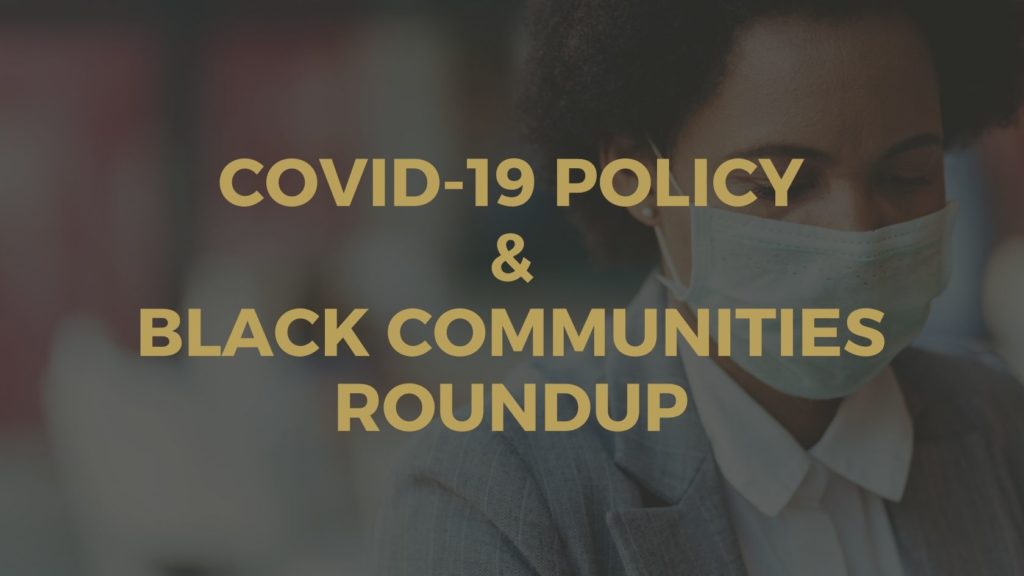
August 18 COVID-19 Policy & Black Communities Roundup
Kamala Harris Announced as Vice Presidential Candidate for Joe Biden
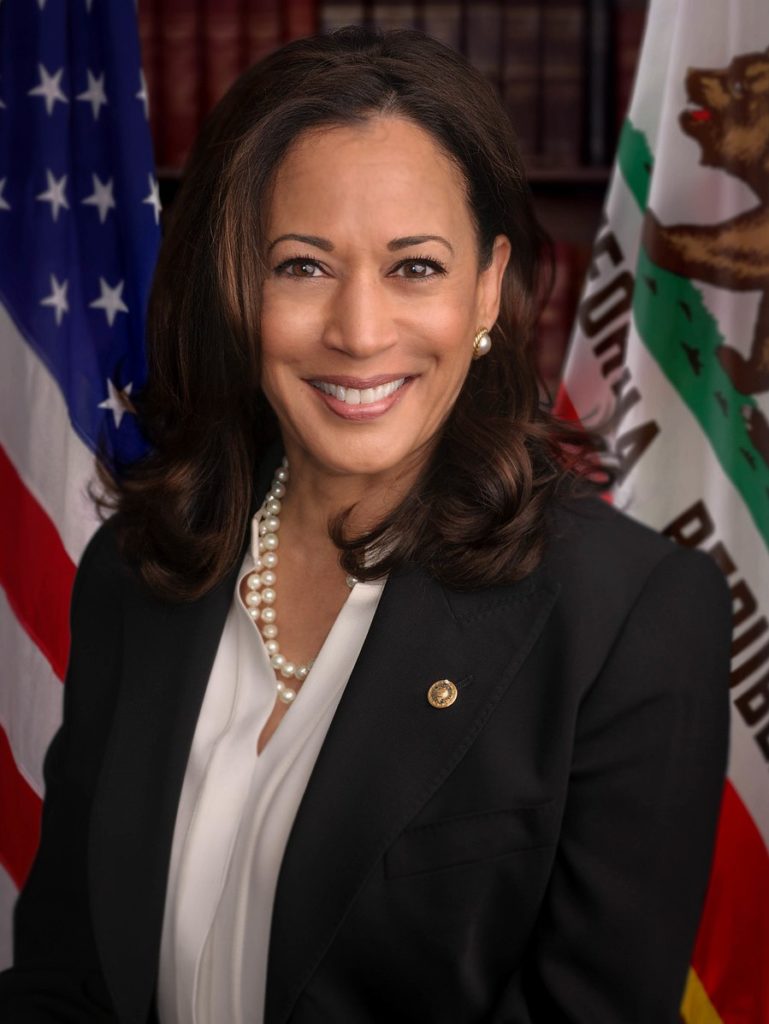
Last week, Democratic Presidential candidate former Vice President Joe Biden announced Senator Kamala Harris (D-CA) as his running mate, making the Senator the first Black and South Asian woman to run on a major political party’s presidential ticket. Senator Harris has introduced a number of bills that would support Black communities during the COVID-19 crisis, including the COVID-19 Bias and Anti-Racism Training Act of 2020, the VoteSAFE Act of 2020, the Monthly Economic Crisis Support Act, and the Saving our Street Act. Senator Harris is the 2018 recipient of the Joint Center’s highest honor—the Louis E. Martin Great American Award.
Threatening Voting Rights by Undermining the US Postal Service
President Trump expressed opposition to funding the U.S. Postal Service and providing election aid to states because he wants to limit the number of voters who are able to cast their ballots by mail. Trump donor and new Postmaster General Louis DeJoy has instituted organizational changes at USPS, including reduced overtime and fewer operating hours, resulting in mail delays. The USPS is also taking 10 percent of its mail-sorting machines out of service.
The changes come amid warnings that voters in most states and the District of Columbia could be at risk of not having their ballots delivered to election offices in time. Secretaries of States in states such as Michigan and Ohio have already begun making changes to increase the likelihood that voters are able to cast their ballots. In our report Pandemic Relief Priorities for Black Communities, the Joint Center called on Congress and the Administration to ensure the U.S. Postal Service is adequately funded to ensure that votes-by-mail arrive in time to be counted (in 2016 23% of absentee ballots rejected were invalidated because they were “not received on time/missed deadline,” sometimes through no fault of the voter).
Stimulus Remains Stalled As Congress Takes Recess
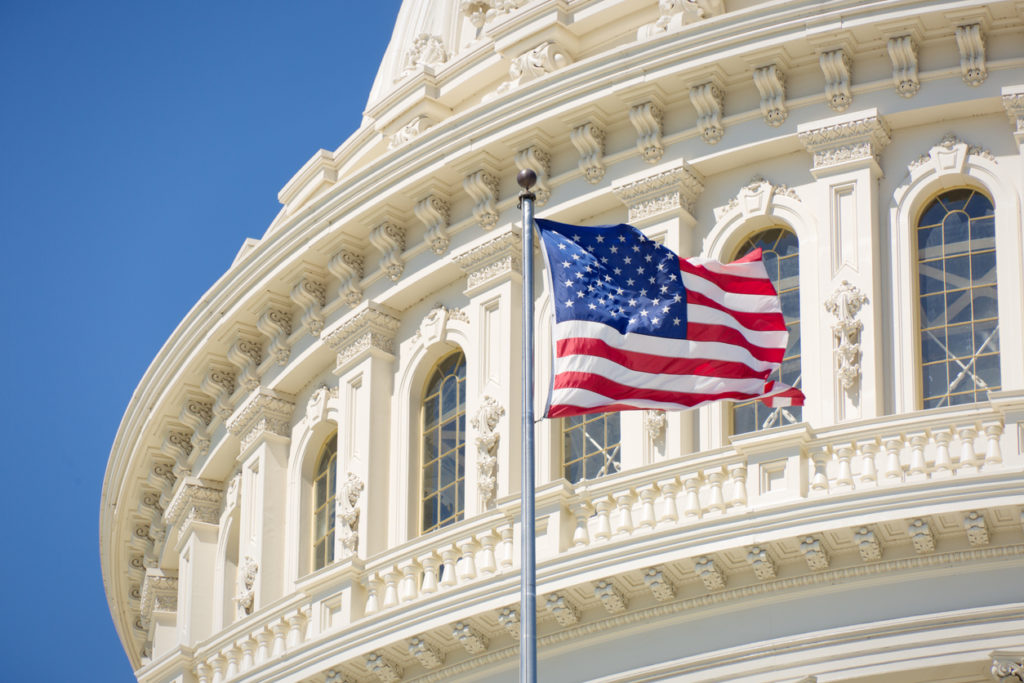
As millions of Americans face the prospect of living on the precipice of economic disaster, last week, the GOP-led Senate left Washington, DC to begin its summer recess until September while still deadlocked with House Democrats on negotiations for the next COVID-19 pandemic relief. The Senate is scheduled to reconvene on September 8, but could return with 24-hour notice if the White House, U.S. Treasury Secretary Steven Mnuchin, and House Democrats can agree on terms for a new round of stimulus and schedule a vote.
Democrats have offered to reduce their proposed $3.4 trillion package by $1 trillion, while the GOP has refused to consider anything above its proposal of about $1 trillion, raising the specter of an attempt to include coronavirus relief as part of a short-term government funding bill. This option comes with its own risks including a government shutdown if the effort fails.
The two sides remain far apart on various issues, including the amount of weekly federal unemployment relief and funding for state and local governments, legal protections for businesses that reopen during the pandemic, and how the reopening of schools should be funded.
Noting additional burdens placed on states by President Trump’s executive order on unemployment insurance, a group of state and local government associations released a statement emphasizing the importance of aid to cities, counties, and states in future coronavirus relief packages. Following Congress’s departure, President Trump tweeted support for state and local aid.
The National Urban League released the 2020 State of Black America report titled Unmasked to match “the national mood for serious introspection, exposing the human toll and economic devastation of a global pandemic on Black America while laying bare the deep rooted inequities that predated the pandemic and accelerated the virus’s deadly spread.”
Economic Studies & COVID-19
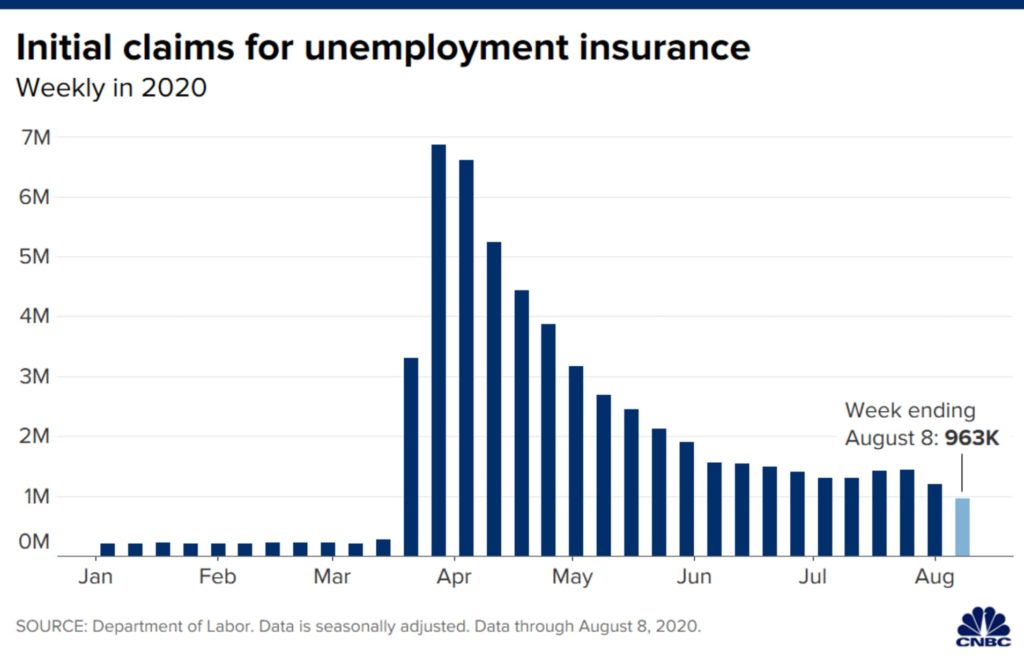
Initial unemployment insurance claims for the week ending August 8 totaled 963,000, marking the first week that claims fell below one million in 20 weeks. The week’s total claims is still higher than the pre-coronavirus single-week record high of 695,000 claims in 1982. 15.5 million people have been collecting job benefits for at least two weeks.
The Wall Street Journal reported that “housing is another key dimension of pandemic-induced inequality—amplifying longstanding racial gaps in financial stability.” The article noted that new census bureau data showed that 22% of Black households, 21% of Latinx households, and 9% of white households either missed or were late on June rent or mortgage payments as of July 21. In tracking the extent of hardship caused by households suffering during the pandemic, the Center on Budget and Policy Priorities found that for the week ending July 21, 42% of Black children lived in a household that was behind on rent or mortgage and/or did not get enough to eat, compared to 28% of all children.
The Washington Post highlighted that the coronavirus crisis escalated from being the “great equalizer” to “Black and brown communities are suffering the most at a time when racial equity is at the forefront of America’s collective conscience.” The article referenced an academic study from May that found the relative risk of death for Black populations to be 3.57 times higher than white populations.
A report by Make the Road New York: Hester Street surveyed 246 working class immigrant, Black, Asian, and Latino people in New York in May and July and found that of the 205 responses “66% of respondents were still out of work, close to 60% were unable to pay rent for May, June, and July, and 85% were worried about paying August rent.”
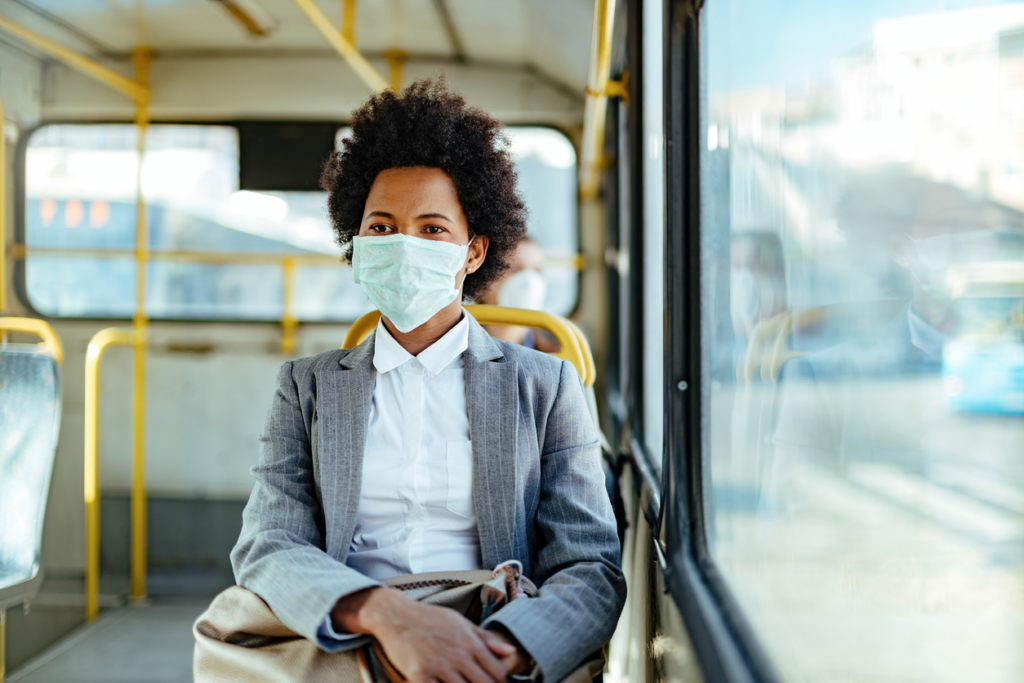
Economists Bradley Hardy and Trevon Logan explored how the “the pandemic and its broader economic and health consequences are disproportionately impacting Black Americans” in a new essay for The Hamilton Project. The researchers highlight the pre-existing tenuous economic position of Black workers, the likelihood of Black worker exposure to COVID-19, consequences of COVID-19 for Black households, and potential policy solutions through strengthening the safety net.
Economist Darrick Hamilton penned an op-ed for Politico arguing for a “paycheck guarantee” to rescue the economy and support Black workers. A paycheck guarantee would require employers to keep workers on payroll, while the federal government sends them paychecks directly. According to Hamilton, this kind of policy—which has been implemented in Germany, Denmark, Australia, and France—would directly help Black workers.
NBC News examined the pandemic’s impact on women business owners and found that women “made up less than half of the U.S. workforce, but accounted for 55 percent of the 20.5 million jobs lost.” Black, Hispanic and Asian women were hit especially hard by the slowdown in the economy. While there is no data available about how many Black women-owned businesses have gone out of business due to the coronavirus pandemic, data shows that businesses for this group decreased by 41% after the Great Recession. Forbes Contributor Geri Stengel emphasized that “[t]his pattern must not be repeated with this economic downturn. Yet, the signs are already here: The Covid-19 crisis is already hurting Black women entrepreneurs more.”
The Economic Policy Institute examined the unequal pay received by Black women essential workers as compared to their white male counterparts. By EPI’s estimation, as compared to white men in the same occupation, Black women registered nurses earn about $6 less per hour; Black women child care workers earn nearly $3 less per hour, and Black women grade school teachers earn nearly $7 less than per hour.
Of the total $660 billion allocated as Paycheck Protection Program Funds, as of August 8 (the last day loan applications from participating lenders were accepted by the U.S. Small Business Administration program), $525 billion in loans had been distributed and the average loan size was $100,729.
Political Studies & COVID-19
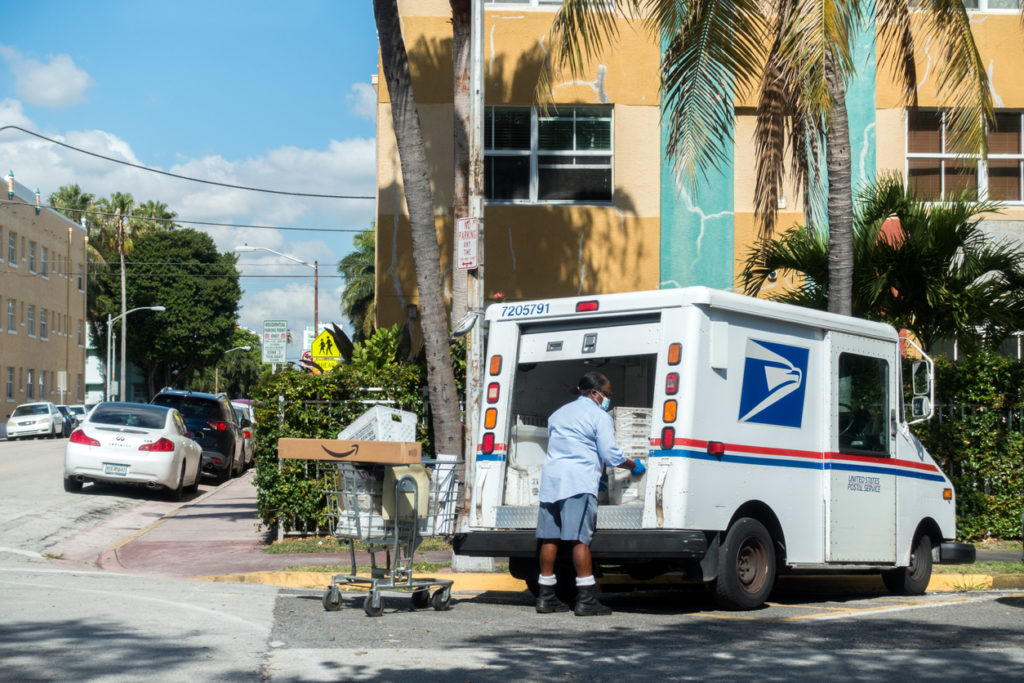
As President Trump continues to oppose more money for the United States Post Office, critics of the President’s decision claim that this is an attempt to suppress mail-in voting. The Economic Policy Institute points out that the president’s refusal to offer pandemic relief to the post office will be especially tragic for Black workers and working families who make up 21.9% of postal workers. Paul Prescod penned a detailed article in Jacobin Magazine outlining the necessity to fund state and local governments as well as the United States Postal Service to prevent massive unemployment in the Black community. Despite President Trump’s opposition to vote-by-mail, a New York Times analysis predicts that “at least three-quarters of all American voters will be eligible to receive a ballot in the mail for the 2020 election” due the coronavirus precautions taken by state leaders.
Recognizing the need for healthy in-person voting options, the Brennan Center for Justice and the Infectious Disease Society of America released a guide for “making polling places as healthy as possible during the pandemic.” Recommendations include working with public health departments to check poll workers for COVID-19 symptoms, ensuring an adequate number of polling locations, and providing well ventilated locations that can accommodate social distancing.
Several organizations—including the Alliance of Students at the Polls and Power the Polls—are recruiting young poll workers in response to many older poll workers staying home due to COVID-19 concerns. According to a poll cited in NPR, 58% of poll workers are over age 60.
On the 100th anniversary of the 19th Amendment—which granted women the right to vote—Teen Vogue interviewed several women including Congresswoman Ayanna Pressley and Black Lives Matter Youth Vanguard Co-Founder Thandiwe Abdullah about voter suppression and organizing on-the-ground.
Facebook launched a Voting Information Center as part of its voting information campaign that will provide election news, tools through social media to recruit poll workers, and information on how to register and vote.
While some attempt to attribute disproportionately high Black COVID-19 mortality rates to shortcomings of “individual responsibility,” a study of more than 6,000 adults showed that Black Americans are more likely than white Americans to follow coronavirus precautions. According to a Nationscape survey, white respondents were more likely than Black respondents to say they had left their house for nonessential purposes and socialized with others while not maintaining social distancing. White respondents (91%) are finally stating to report that they are wearing masks in public as often as African Americans (92%).
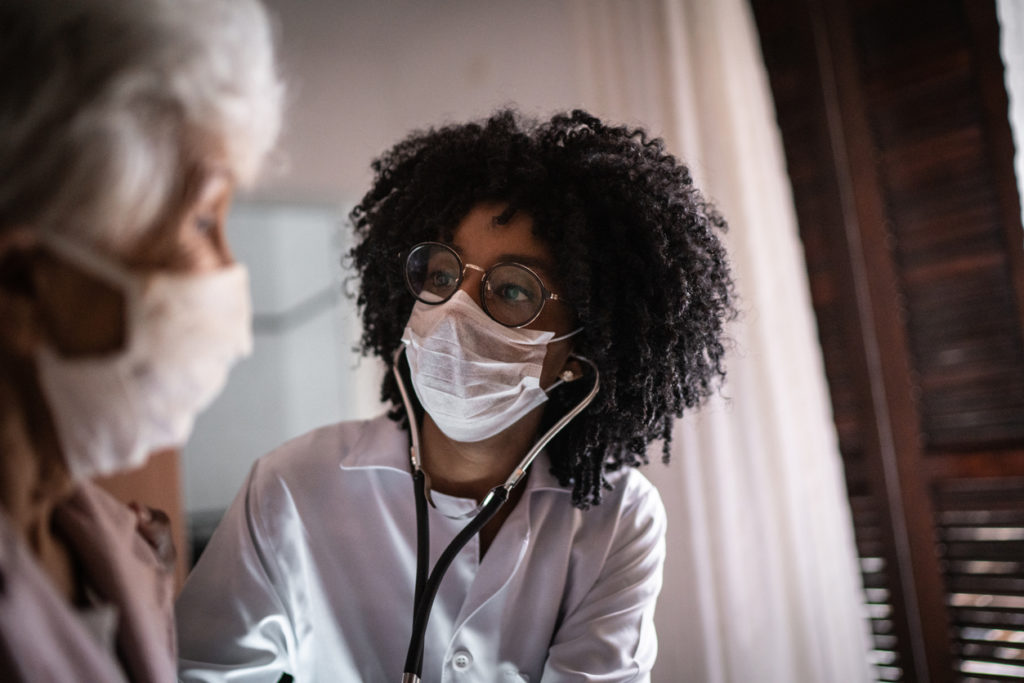
Death statistics compiled by APM Research Lab found that from April 13 to August 4, “Black Americans continue to experience the highest overall actual COVID-19 mortality rates (80.4 per 100,000)—more than twice the rate of white Americans (35.9 per 100,000) or Asian Americans (33.1 per 100,000), who have the lowest COVID-19 mortality rates. In 2020, more Black Americans will die of COVID-19 than will succumb to diabetes, strokes, accidents, or pneumonia. In fact, COVID-19 is currently the third leading cause of death for Black Americans.”
“The COVID-19 crisis is only exacerbating the discrimination that Black patients and other patients of color already face from providers,” according to VOX in an article examining experiences of Black pregnant women with doctors and medical facilities during the pandemic. Community Catalyst and the National Medical Association issued a paper urging Congress to create more access to Medicaid in order to lessen health inequities for Black people during the COVID-19 pandemic by boosting and stabilizing Medicaid funding; investing in Medicaid providers; incentivizing states to expand Medicaid; supporting Medicaid connections in re-entry; and extending Medicaid after childbirth to reduce mortality.
A new Centers for Disease Control and Prevention (CDC) study surveyed adults aged ≥18 years across the U.S. from June 24-30 and found “considerable elevated adverse mental health conditions associated with COVID-19.” Black and Latino respondents reported worse COVID-19 related trauma and stressor related disorder (TSRD) and increased substance use to cope with pandemic related stress or emotions compared to all other racial groups involved in the study.
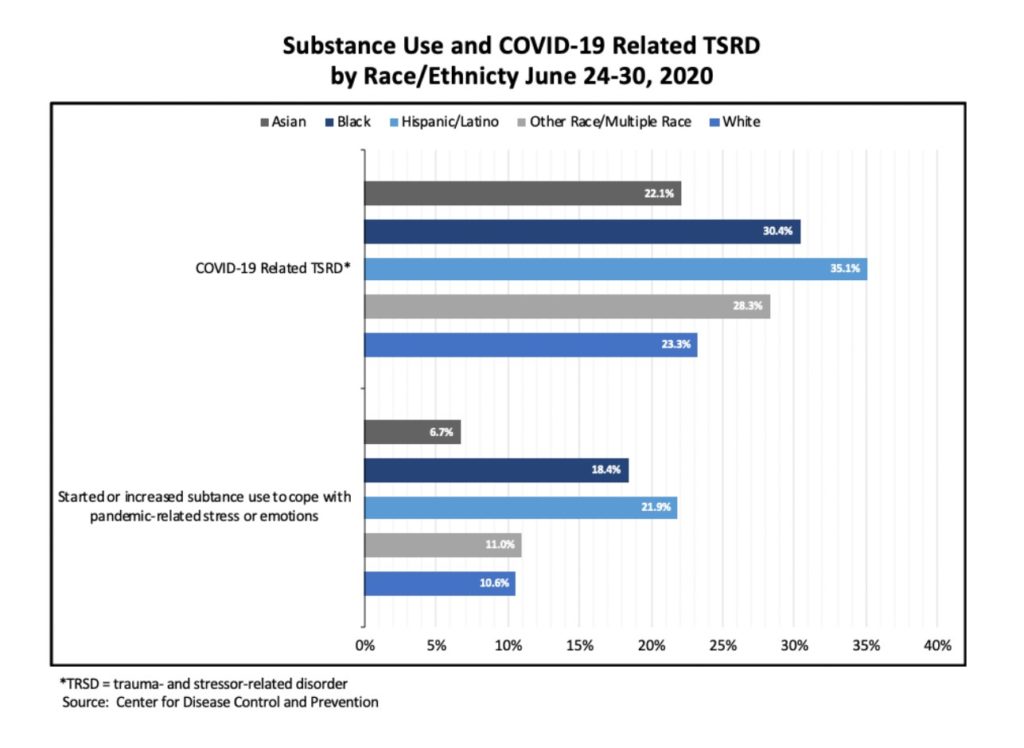
CNN reported that researchers have not recruited adequate numbers of Black and Latino participants to join clinical trials of a coronavirus—which could delay the development of a vaccine. While African Americans and Latinos collectively make up over 40% of COVID-19 deaths and 30% of the population in the U.S., they account for only 10% of vaccine clinical trial participants. A New England Journal of Medicine article comes to a similar conclusion.
Kaiser Family Foundation just reviewed various studies on race and COVID-19 and found that Black mortality rates were over twice as high as white mortality rates and age-adjusted hospitalization rates for African Americans were almost five times higher than whites. The Kaiser study also cited a Harvard report that shows that between February 1 and May 20 African Americans lost more years of potential life than whites (45,777 years vs. 33,446 years), even though the overall African American population in the U.S. is much smaller.
The Center for American Progress evaluated how the wealth gap could cause Black children to fall behind in school this fall due to a lack of internet and computer access, stating that “[d]ue to systemic racism in the housing industry, predominantly Black neighborhoods tend to have lower property values. This, in turn, means the schools in these same neighborhoods have fewer financial resources—and these financial pressures have only increased and exacerbated racial inequities during the pandemic.”
Noelia Rivera-Calderón, a Tom Steel Fellow in the Education Team at the National Women’s Law Center opined in The Hill that America can take this pandemic as a resetting opportunity to reimagine how schools can meet the needs of LGBTQ students and students of color who are already “over-policed and over-disciplined.”
The Thurgood Marshall College Fund and the United Negro College Fund partnered with Testing For America to provide necessary testing to students and faculty at Historically Black Colleges and Universities (HBCUs) as part of reopening practices in the fall.
Lyft will offer more than one million rides to underserved communities as part of a newly formed LyftUp Alliance program, which is chaired by Valerie Jarrett and in partnership with the Black Women’s Roundtable, My Brother’s Keeper Alliance, the NAACP, the National Action Network, the National Bail Fund Network, and the National Urban League.
Movement Building
Black Futures Lab hosted a virtual yoga session to rest, reflect, and restore bodies, minds, and emotions.
Center for American Progress issued a petition demanding that Congress commit to financing COVID-19 vaccines for every American.
Color of Change, MediaJustice, Worth Rises, Free Press Action, and United Church of Christ held a virtual press conference urging Congress to include the COVID-19 Compassion and Martha Wright Prison Phone Justice Act in the next COVID-19 relief bill.
Color of Change issued a petition demanding the NCAA and athletic conferences to guarantee scholarships, provide fair pay, cover all COVID-19 related medical expenses, and offer hazard pay to student-athletes who are still being asked to play football games while other students stay at home.
Greater New Haven Creative Sector Relief Fund distributed $175,380 to 420 artists and arts organizations in the region who were financially impacted by COVID-19.
AFL-CIO, Jobs With Justice, 9to5, ROC United, and more issued a pledge to fast on August 11 in solidarity with the workers organizing food distributions at Senate offices in Arizona, North Carolina, Georgia, Texas, and other states refusing to take action to support unemployed workers.
SisterLove is providing free and confidential HIV at-home testing.
The NAACP launched the “Black Voices Change Lives” campaign to engage Black voters by implementing a turnout strategy called indirect relational voter turnout (IRVT) “where high-propensity Black voters are recruited as volunteers to encourage low-frequency Black voters to vote.”
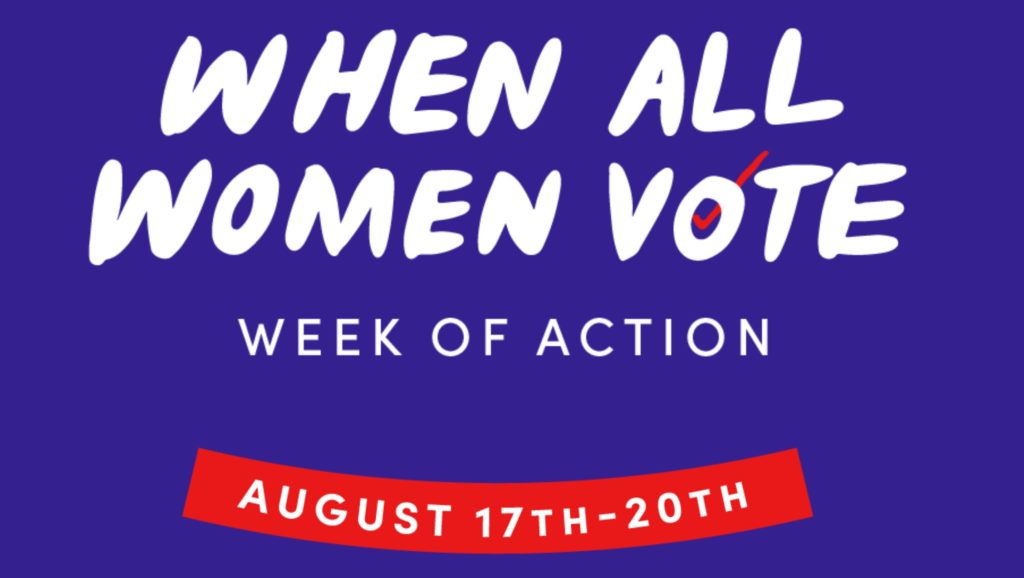
The United State of Women launched a week of action from August 17-20 in celebration of the 100th anniversary of the ratification of the 19th Amendment. Events include signing the “When All Women Vote” pledge, panel conversations exploring the history of the 19th Amendment, building individualized voter plans, and a virtual celebrity couch party that incentivizes voters to build their voting plan.
Events
Upcoming events include “AIDS vs. COVID-19: How Painful Lessons Should Shape Today’s Response” (The Raben Group, August 18); “COVID-19 and the Economy: Recession, Repairing, and Rebuilding” (Center for American Progress, August 18); “The Effects of COVID-19 on Our Democracy” (Center for American Progress, August 19); “Living While Black in America IG Live Series” (CBC, August 20); “Fiscal Impacts from the COVID-19 Pandemic” (REMI, August 20); “Powering America’s Economic Recovery” (Politico, August 20); “The Masks, The Mail, The Myths” (The Raben Group, August 20); “Making 2021 the Start of a Better Way Forward” (Center for American Progress; August 20).
Last week’s events were held by The Hamilton Project, Common Sense Media, Economic Policy Institute, Groundwork Collaborative, Knight Foundation, National Urban League, and the Urban Institute.
Podcast
Building Power with Demos President K. Sabeel Rahman and Recognizing a Historic Win in North Carolina (Race Forward)
The Joint Center thanks the Annie E. Casey Foundation, the Boulé Foundation, the Democracy Fund, Toyota, Toyota Motor North America, Inc., UPS, and the Walmart Foundation for additional support that has allowed us to do some of our COVID-19 and Black Communities work.

